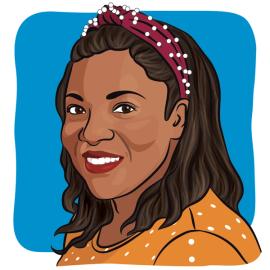- About Us
- Advertise / Support
- Editorial Board
- Contact Us
- CancerNetwork.com
- TargetedOnc.com
- OncLive.com
- OncNursingNews.com
- Terms & Conditions
- Privacy
- Do Not Sell My Information
- Washington My Health My Data
© 2025 MJH Life Sciences™ and CURE - Oncology & Cancer News for Patients & Caregivers. All rights reserved.
Living Beyond a Rare Cancer and What Others Do Not See

Tamron was diagnosed with peritoneal mesothelioma — a rare cancer caused by asbestos exposure — in 2007, as a 21-year-old new mother. As a woman diagnosed at just 21 years of age, she was anything but the typical mesothelioma patient. After more than a decade of living with mesothelioma, she began to share her experiences with others by blogging on Asbestos.com.
The challenges of being diagnosed with a rare cancer are real, but so is the strength that comes from thriving through it.
When I was first diagnosed with peritoneal mesothelioma at 21 years old, I did not even know what the word meant. Most people have not heard of it, and that’s part of what makes rare cancers so isolating. There is no roadmap, no familiar path, and often, no one who understands what you are going through.
I was initially missed diagnosed with a fibroid tumor during my pregnancy. Being told that that my stomach pains and bloating were “normal” during pregnancy. I was five months postpartum when the words peritoneal mesothelioma finally entered the conversation, it felt foreign and shocking at the same time.
The Hidden Struggles of Rare Cancers
When your diagnosis is rare, there is a different kind of loneliness that settles in. The waiting rooms are filled with people who do not have your cancer type. The brochures do not mention your disease. Even online, information was limited for me. I quickly learned that rare does not just describe your cancer, it describes your experience.
Finding the right specialist was another challenge. I had to become my own advocate, learning medical terms, researching the little information that was available 18 years ago, and asking questions I didn’t even know how to phrase.
But the hardest part was not just the coordination, it was the invisibility. When people do not recognize your diagnosis, they do not always know how to respond. Some minimize it. Others change the subject. That lack of awareness can make you feel like your story does not belong in the larger cancer conversation.
Faith and Advocacy in the Unknown
In those early days, I had more questions than answers. I did not know anyone who looked like me living with mesothelioma. There were moments when fear felt bigger than my faith. But over time, I learned that advocacy could coexist with belief, and that God could guide me through the unknown and equip me to help others walking the same road.
Faith became my anchor, and advocacy became my purpose. Speaking up about peritoneal mesothelioma not only helped me heal but also gave this rare cancer diagnosis a human face. Every time I share my story, another cancer survivor reaches out saying that they finally feel seen. That is the power of speaking what others are afraid to name.
Lessons That Reach Beyond Rare
Living beyond rare cancer has taught me lessons that apply to anyone facing a life-changing diagnosis:
- Coping with uncertainty takes daily courage. You do not need to know the whole plan to take your first step.
- Advocating for yourself is not pushy, but it is necessary. Ask questions. Seek second opinions. Remember that your voice matters.
- Building a care team that listens is essential. Healing is a collaboration, not a solo act.
- Faith and community will sustain you when information runs dry. When science is limited, hope still speaks volumes.
What I Want Others to Know
Eighteen years later, I have learned that “rare” does not mean forgotten, it means our stories are still being written. The challenges of being diagnosed with a rare cancer are real, but so is the strength that comes from thriving through it. If you are navigating a diagnosis that feels unknown, hold on. Keep seeking answers, keep praying, and keep believing that your life has purpose beyond what the statistics say.
You may not see many people like you in the brochures, but you are not alone, and your story matters more than you could ever know.
This piece reflects the author’s personal experience and perspective as a breast cancer survivor. For medical advice, please consult your health care provider.
For more news on cancer updates, research and education, don’t forget to subscribe to CURE®’s newsletters here.
Related Content:



